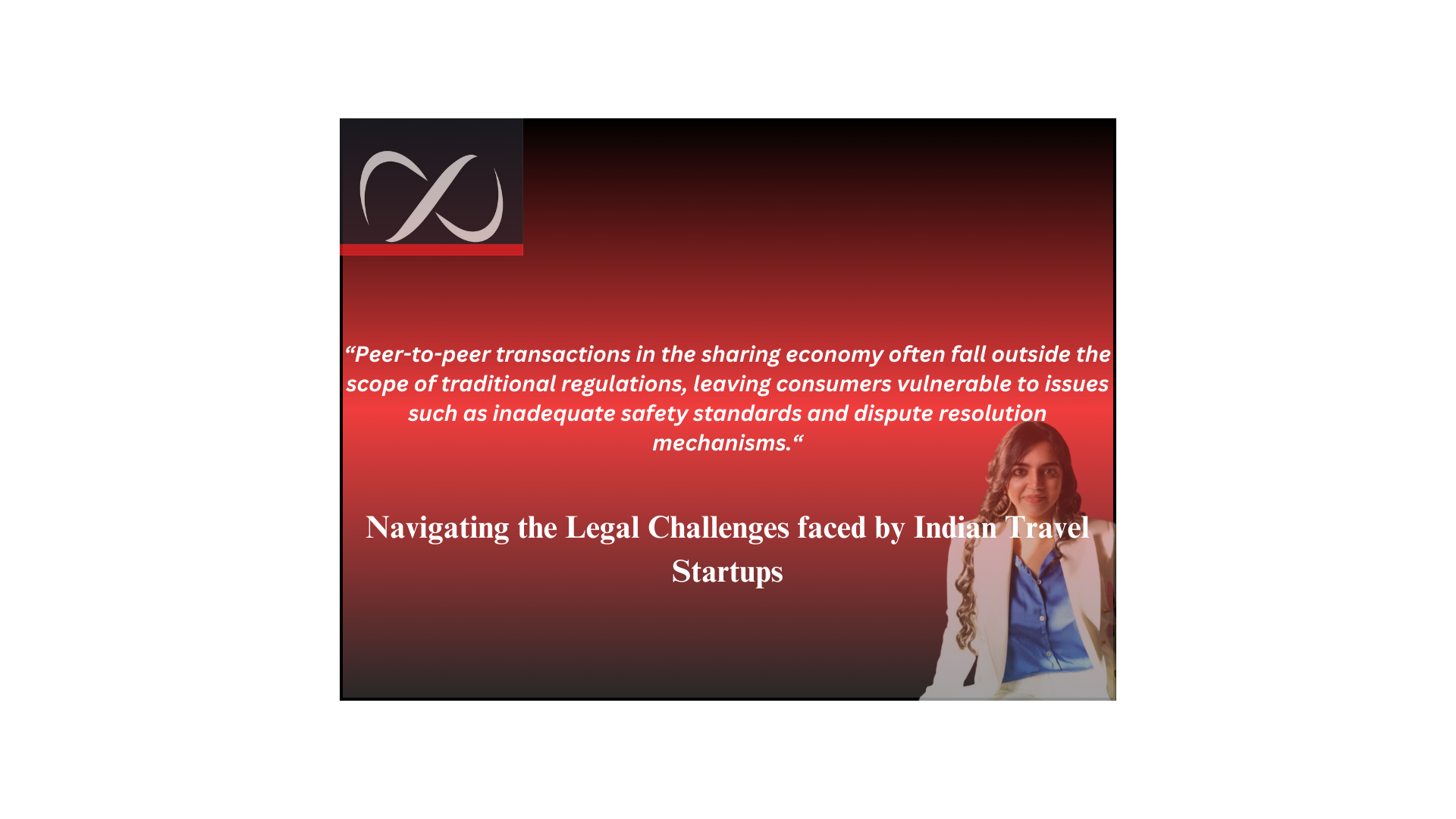
The travel industry, once governed by established players and traditional models, is undergoing a profound transformation fueled by disruptive technologies and the rise of the sharing economy. The start-up Travel Solutions, a pioneering startup based in India, is at the forefront of this revolution, reshaping the travel landscape with innovative solutions and cutting-edge technologies. This article delves into the intersection of these trends, exploring their impact on the travel industry and the legal challenges they present. Additionally, it sheds light on the start-up Travel Solutions’ journey, highlighting the legal hurdles faced by the company and the strategies employed to overcome them.
Introduction to the start-up Travel Solutions
The start-up Travel Solutions, headquartered in India, is revolutionizing the travel industry with its innovative approach and technology-driven solutions. Specializing in personalized travel experiences, flexible accommodations, and seamless booking services, the start-up Travel Solutions caters to the evolving needs of modern travelers. As the company continues to disrupt the market and expand its presence, navigating the legal landscape becomes imperative for ensuring compliance, consumer protection, and sustainable growth.
The Emergence of Disruptive Technologies and the Sharing Economy in Travel
Traditionally, the travel industry has been characterized by established corporations and conventional business practices. However, with the advent of disruptive technologies and the sharing economy, the landscape has shifted dramatically. Platforms like Airbnb, Uber, and Expedia have democratized travel, offering consumers greater choice, flexibility, and affordability.
These platforms leverage technology to connect travelers with a wide range of accommodation options, transportation services, and unique experiences. For instance, Airbnb allows individuals to rent out their properties to travelers, while Uber provides convenient transportation services through a network of independent drivers.
Legal Challenges in the Sharing Economy
While the sharing economy has brought about numerous benefits, it also presents unique legal challenges that must be addressed:
1. Consumer Protection and Safety
Peer-to-peer transactions in the sharing economy often fall outside the scope of traditional regulations, leaving consumers vulnerable to issues such as inadequate safety standards and dispute resolution mechanisms. For instance, a guest staying at an Airbnb property may not have the same level of protection as a guest staying at a traditional hotel.
To address these challenges, collaboration among industry stakeholders is essential. Platforms, users, and governments must work together to develop clear guidelines for safety protocols, background checks, and insurance requirements. Establishing efficient dispute resolution mechanisms is crucial to address issues like property damage and cancellations promptly and fairly.
2. Data Privacy
Travel apps collect a wealth of user data, including sensitive information such as travel preferences and financial details. Concerns arise regarding data security breaches and unauthorized use of personal data. For example, a data breach at a travel booking platform could expose users’ personal information to hackers.
To address these concerns, travel startups must prioritize data security by implementing robust encryption and security protocols. Transparent privacy policies outlining data collection practices and providing users with control over their data are imperative. Compliance with data privacy regulations like GDPR and CCPA is essential to protect user privacy rights and maintain consumer trust.
The start-up Travel Solutions’ Legal Compliance Journey
As a leading player in the travel industry, the start-up Travel Solutions has encountered and overcome various legal challenges in the sharing economy:
1. Consumer Protection and Safety
The start-up Travel Solutions prioritizes consumer safety and protection by collaborating with industry stakeholders and government authorities to develop and implement robust safety protocols and dispute resolution mechanisms. The company conducts thorough background checks on hosts and service providers to ensure the safety and security of its users.
2. Data Privacy
The start-up Travel Solutions places a strong emphasis on data privacy and security, implementing state-of-the-art encryption and security measures to safeguard user information. The company maintains transparent privacy policies and provides users with control over their data, ensuring compliance with global data privacy regulations.
3. Government Regulation
The start-up Travel Solutions engages proactively with government agencies and regulatory bodies to advocate for policies that support innovation while safeguarding consumer protection and data privacy. The company provides feedback on proposed regulations and collaborates with lawmakers to develop clear guidelines for safety standards and data security in the sharing economy.
4. Industry Responsibility
As a responsible player in the travel industry, the start-up Travel Solutions takes its legal and ethical responsibilities seriously. The company invests in technologies and processes that enhance consumer safety and data security, prioritizing the well-being and privacy of its users.
5. Consumer Awareness
The start-up Travel Solutions educates consumers about their rights and responsibilities within the sharing economy, providing educational resources, FAQs, and guidelines to help them make informed decisions. The company fosters transparency and trust, empowering users to navigate the sharing economy safely and responsibly.
Conclusion: Embracing Innovation While Ensuring Legal Compliance
In conclusion, the convergence of disruptive technologies and the sharing economy has reshaped the travel industry, unlocking unprecedented opportunities for innovation and growth. The start-up Travel Solutions, as a pioneering startup in India, has navigated various legal challenges in the sharing economy by prioritizing consumer protection, safety standards, and data privacy. Through collaboration with industry stakeholders, government authorities, and consumers, the company has forged a path towards legal compliance and responsible governance in the travel industry. As the travel landscape continues to evolve, the start-up Travel Solutions remains committed to embracing innovation while ensuring legal compliance, fostering a more inclusive, accessible, and sustainable future for travelers worldwide.
Expanding on Legal Challenges and Solutions
To delve deeper into the legal challenges and solutions in the sharing economy, let’s explore each aspect further:
1. Consumer Protection and Safety
In the sharing economy, consumers often rely on platforms to ensure their safety and security. However, the decentralized nature of these platforms can make it challenging to establish and enforce consistent safety standards.
Solution: Collaboration among industry stakeholders is essential to address these challenges. Platforms can work with users and governments to develop clear guidelines for safety protocols, background checks, and insurance requirements. By implementing efficient dispute resolution mechanisms, platforms can also address issues like property damage and cancellations promptly and fairly.
2. Data Privacy
The sharing economy relies heavily on user data to match consumers with providers and facilitate transactions. However, collecting and storing this data comes with significant privacy risks, especially in light of recent data breaches and privacy scandals.
Solution: Travel startups must prioritize data security by implementing robust encryption and security protocols. Transparent privacy policies that outline data collection practices and provide users with control over their data are crucial. Compliance with data privacy regulations like GDPR and CCPA is essential to protect user privacy rights and maintain consumer trust.
3. Government Regulation
Governments play a critical role in shaping the regulatory environment for the sharing economy. However, regulating these platforms can be challenging due to their decentralized nature and the lack of clear legal frameworks.
Solution: Regulatory frameworks need to be flexible and adaptable to keep pace with technological advancements in the sharing economy. Governments can work with industry stakeholders to develop regulations that foster innovation while safeguarding consumer protection and data privacy. By creating clear guidelines for safety standards, data security, and dispute resolution, governments can provide certainty and stability for both consumers and businesses.
Industry Responsibility
As a responsible player in the travel industry, the start-up Travel Solutions takes its legal and ethical responsibilities seriously. The company invests in technologies and processes that enhance consumer safety and data security, prioritizing the well-being and privacy of its users.
Consumer Awareness
The start-up Travel Solutions educates consumers about their rights and responsibilities within the sharing economy, providing educational resources, FAQs, and guidelines to help them make informed decisions. The company fosters transparency and trust, empowering users to navigate the sharing economy safely and responsibly.
Conclusion: Embracing Innovation While Ensuring Legal Compliance
In conclusion, the convergence of disruptive technologies and the sharing economy has reshaped the travel industry, unlocking unprecedented opportunities for innovation and growth. The start-up Travel Solutions, as a pioneering startup in India, has navigated various legal challenges in the sharing economy by prioritizing consumer protection, safety standards, and data privacy. Through collaboration with industry stakeholders, government authorities, and consumers, the company has forged a path towards legal compliance and responsible governance in the travel industry. As the travel landscape continues to evolve, the start-up Travel Solutions remains committed to embracing innovation while ensuring legal compliance, fostering a more inclusive, accessible, and sustainable future for travelers worldwide.









